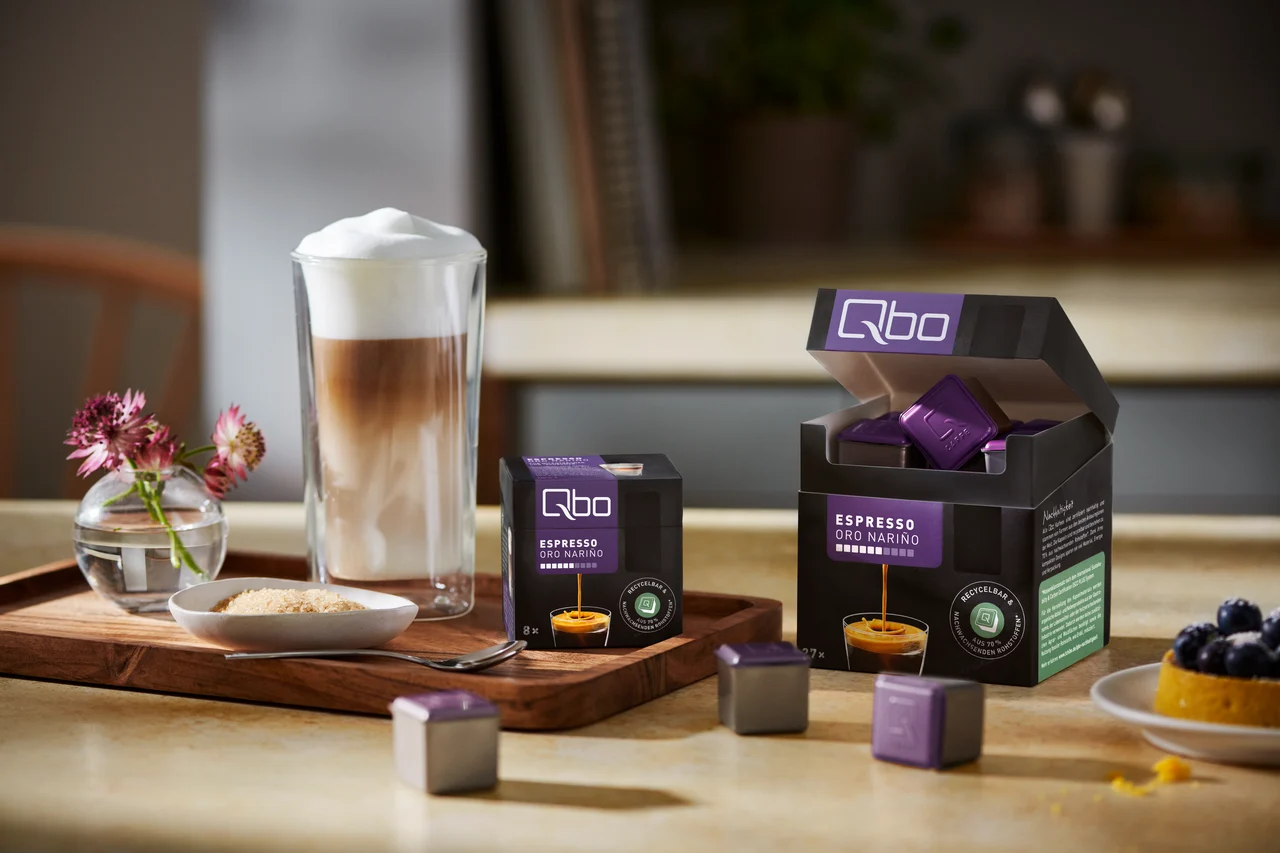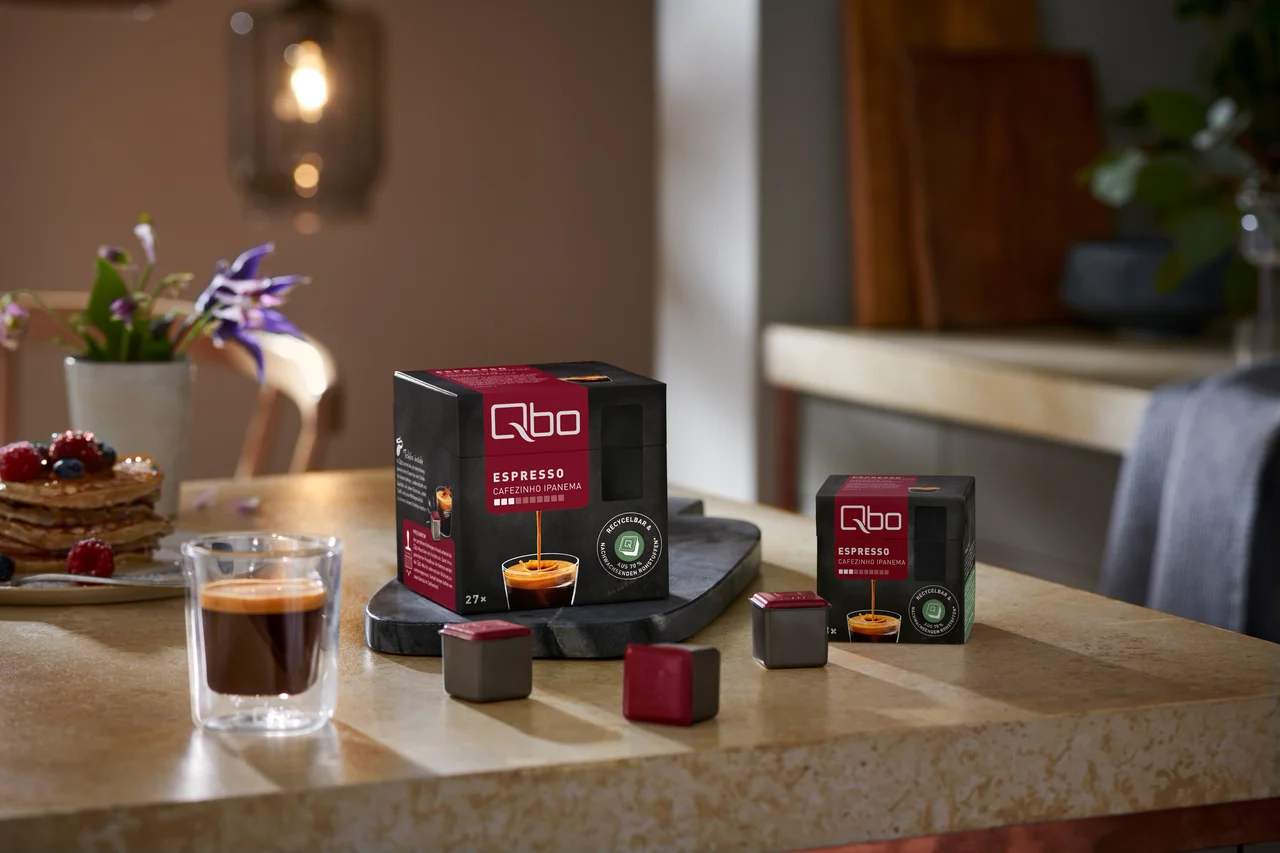
Case story
4 minute read
Bringing the right partners together: how Tchibo, Berry and Neste teamed up to make your morning cup of coffee more sustainable
Coffee maker Tchibo is committed to sustainability and this commitment led to the search for more sustainable ways to produce coffee capsules. Teaming up with Berry and Neste allowed the company to find a solution that is more sustainable without compromising on quality.
Not much that can change the course of the entire day as drinking a good cup of coffee in the morning. The taste, the smell, the temperature… Good coffee rocks. Yet, in the recent past, the reputation of coffee coming in capsules has taken some hits. While the capsules are certainly practical, their environmental footprint can’t be disregarded as their usage generates a lot of packaging waste.
That’s why at German coffee giant Tchibo, the team working on the company’s Qbo coffee capsules started thinking of ways to make their capsules more sustainable. The capsules are made out of polypropylene - a common and high-quality polymer with many applications. While it comes with the benefit of being recyclable, most polymers today are still based on virgin fossil oil - and so is polypropylene.
“Tchibo is committed to sustainability and this commitment made the need to find more sustainable ways to produce the capsules imminent”, says Marius-Konstantin Wiche, Development Manager Capsule & Innovation at Tchibo. “The search for a solution comes with some prerequisites, of course. For example, the quality and taste of the coffee couldn’t be affected. Hence, a more sustainable solution with otherwise as little changes as possible was desirable. That is why we focused on replacing the raw materials, not the polypropylene itself.”
Searching and finding
Investigating more alternatives to capsules based on virgin fossil oil, the Tchibo team got into discussions with Neste - a partnership that doesn’t seem intuitive at first sight: although the word “neste” means “liquid” in Finnish, there was and is no direct touchpoint between both companies or between Neste and coffee making - except for a high demand of coffee across the company’s workforce perhaps.
Nevertheless, the discussions were fruitful as Neste is offering Neste RE - a renewable and recycled feedstock for the polymers and chemicals industry that is able to replace crude oil in the production of polymers - including polypropylene. For Tchibo, Neste RE from renewable raw materials such as waste and residue oils and fats like used cooking oil was particularly interesting.
“A big advantage of Neste RE is: you won’t see any difference to conventional feedstock based on crude oil in the products”, explains Martin Bussmann, Brand Owner Manager at Neste. “It allows for the same quality and the same properties - which are decisive factors for any brand that wants to offer customers the same or a better product experience. The second advantage is that it is a drop-in solution. You don’t need to change the production infrastructure to use it. This makes it easy to introduce it.”

Building bridges
With Tchibo and Neste cooperating, the next step was to establish the required bridges along the value chain. That is how the converting company Berry Global came into play - the partner of Tchibo who supplies empty capsules and lids to be filled with coffee. Berry takes care of choosing the right raw materials for the capsules. For Berry, the introduction of the new capsules supports its recently announced commitment to achieve 30 percent circular plastics use across its fast-moving consumer goods packaging by 2030 as the company envisions decoupling from virgin plastic and fossil fuels in the long term. Together with their production partner, they ensured that the renewable Neste RE found its way into the polypropylene for the Tchibo capsules - and in the process made sure food contact approval was granted to the new materials.
“Supporting our customers’ growing sustainability commitments is a key priority as we plan for the future needs of a net-zero, circular economy,” said Jean Marc Galvez, president of Berry Global Consumer Packaging International. “Delivering the infrastructure and manufacturing capabilities to design products for circularity is one of our core competencies. I am incredibly proud of this partnership and its commitment to demonstrate the potential of renewable raw materials to lower the environmental impact of capsules.”
The results are Qbo coffee capsules based on 70% renewable materials* and contributing to a more sustainable and circular value chain. They come with a significant decrease in their greenhouse gas emissions footprint without any compromises when it comes to quality and properties - of the capsules as well as of the delicious coffee inside them.
Seeing the big picture
The project shows the potential that lies in the cooperation of like-minded companies. It also shows how important it is for companies to see the bigger picture: to understand the needs of other players in their value chain - aside from direct customers or suppliers. Because one thing is for sure: circular economies need to be win-win situations for all parties involved - not only in the coffee business.
*Mass-balanced, ISCC Plus certified.